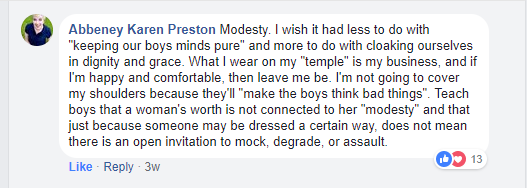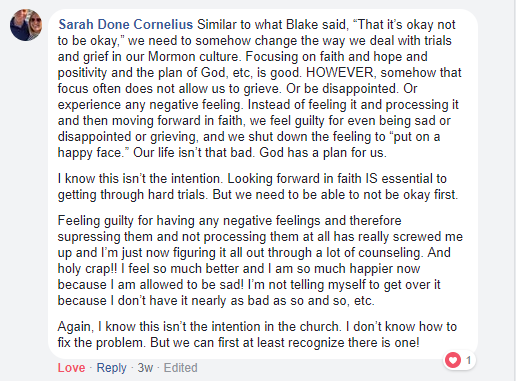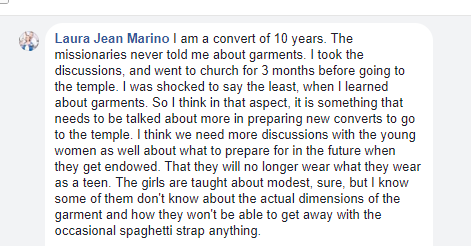
I recently asked my Facebook friends what they wished we talked about more or differently in Church culture. They brought up a lot of different topics, influenced by their different perspectives, experiences, and opinions. However, I found a common thread which linked most responses.
My friends—and perhaps many of us—want a Church culture that thrives on honesty.
As a caveat, of course honesty is a virtue taught at church and upheld by many LDS people. The connotation of honesty I’m referring to specifically is the ability to be open, vulnerable, and direct. Basically, my friends believe we could be more open, more vulnerable, and more direct about certain topics.
Here are a few things my friends hope we will discuss more openly within church culture:
Failure

As Mormons, we want to be the best. We are striving for heaven, a place where we become the best versions of ourselves. We sometimes forget that even with all the effort and all the grace we experience in mortality, perfection isn’t possible here.
We can “enjoy (failure) as a part of life” by being open and honest with friends, family, and members of our ward about what we are struggling with. We may be surprised to find that we are not alone in struggling with perfectionism.
Modesty

Some of my female friends have felt modesty could be taught more effectively. For many women, the focus that Young Women’s leaders take is that women should dress modestly because if they don’t, men will have impure thoughts. Correlating women’s actions with men’s thoughts feels unfair and unethical. Teaching modesty this way can set the precedent for women feeling unjustly responsible for men’s poor decisions. Women are not responsible for what men think.
Katie Blomquist, who is LDS and lives in Maryland, explained:
LDS dress standards are heavily tied to being able to wear temple garments. But I wasn’t taught that in Young Women’s. It was always focused on making sure I wasn’t arousing men.
They aren’t the only ones. Many LDS women in their twenties I have spoken to expressed that their lessons in Young Women’s were geared specifically toward “keeping our boys’ minds pure” rather than toward personal worth and self-respect.
In the future, we would do well to remember the focus the Brethren give on what it means to be modest.
Modesty is an attitude of propriety and decency in dress, grooming, language, and behavior. If we are modest, we do not draw undue attention to ourselves. Instead, we seek to “glorify God in [our] body, and in [our] spirit” (1 Corinthians 6:20; see also 1 Corinthians 6:19).
Chastity

As a sister to modesty, we can also be more open and honest about how we discuss the law of chastity.
My friend Kara Robinson said we should, “change the approach on how we teach chastity. Maybe start off with the difference between worth and worthiness and how each should guide our personal decisions.”
The difference between worth and worthiness is simple: worthiness is dependent upon actions and worth is not. Worth is eternal. Worthiness is changeable. The worth of a soul will always be great in the sight of God, no matter how that soul has strayed.
Using shame and fear tactics is incredibly damaging, especially to young men who believe their worth is tied to their worthiness.
We would do well to invite more open conversations about sex and chastity. “If we aren’t willing to answer our kids’ questions about sex, then they will go elsewhere to find answers,” an anonymous social worker claimed. We can help our kids by being open to questions. We would also do well by being quick to remind struggling young men and women that their worth is not tied to their worthiness.
Temple Preparation
As a convert Laura Marino saw firsthand that there can be serious gaps in temple preparation. She is a mother of four girls, and she plans to help her girls understand their clothing choices will be different before and after going through the temple.
I think we need more discussions with the young women as well about what to prepare for in the future when they get endowed. That they will no longer wear what they wear as a teen. The girls are taught about modesty, sure, but I know some of them don’t know about the actual dimensions of the garment and how they won’t be able to get away with the occasional spaghetti strap anything.
Although we absolutely need to keep the temple sacred, we can still be upfront about the changes young women should prepare for. Being open will help young women and men prepare for the temple with less anxiety.
Trials

Another sore spot in Church culture is knowing how to deal with negativity, grief, and trauma appropriately. We all endure trials which magnify our souls and draw us closer to God. But something has to happen before we reach that point. We need to let ourselves be broken first.
As my friend Blake Stone put it, “It’s okay not to be okay.” Even at church, where we want to present the best version of ourselves, it’s okay not to be okay.
Here’s what my friend Sarah Cornelius added to Blake’s comment:
We need to somehow change the way we deal with trials and grief in our Mormon culture. Focusing on faith and hope and the plan of God, is good. However, somehow that focus often does not allow us to grieve. Or be disappointed. Or experience any negative feeling. Instead of feeling it and processing it and then moving forward in faith, we feel guilty for even being sad or disappointed or grieving, and we shut down the feeling to ‘put on a happy face.’ We need to be able to not be okay first.
Sarah learned this principle by going to therapy. She said she learned that it’s okay to be sad, and that it’s nothing to feel guilty about. She hopes the Mormon culture she’s surrounded by will grow to become more accepting of guilt.
To add my own experience here, not every ward is the same. Some ward cultures are more equipped at dealing with grief and negativity than others are. I absolutely love my ward, because people are willing to be vulnerable over the pulpit, and in the classroom, and in small group discussions. Church really feels like a safe place where we can lay down our burdens and work through things as a community. My concept of what it means to be a ward family has changed tremendously thanks to the culture of my ward that was in place long before I got there.
Questions
Another friend, Lucas Hobbs, expressed his complicated experience with church leaders and questions over the years. He has approached bishops with questions about the history of the Church.
One bishop he asked accused Lucas of breaking commandments and wanting to justify them. The bishop told Lucas his questions were not valid. Lucas genuinely wanted to know the truth. He felt frustrated that his bishop did not understand the intent of his questions.
I’m just interested in knowing what’s right. And when I asked some questions about the church and it’s history, I got attacked and accused of trying to do bad things. I just want to make sure I am where God wants me to be, and doing what God wants me to be doing.
Lucas ended up turning to his religion professors at BYU instead. The professors he spoke with were more willing to hear out Lucas’ questions without making assumptions.
Questions are healthy. The more open we can be about searching out answers to our personal questions and to hearing out others’ questions, the more honest our culture will be.
Diversity
Diversity makes the body of Christ more unique and stronger. We need people with life experience outside of the “Mormon Bubble.” We need people navigating the “roller coaster of activity/ inactivity.” We need people with tattoos.
Rob Ghio explained in his Mormon Hub article “Tattoos and other Things we Could Use More of at Church”:
The gospel is transformative: Our focus is less on what happened yesterday and more on what we can become today. And tattoos don’t equate with evil anyway. It’s more culture than commandment.
We need people on God’s side— all different kinds of people with all different backgrounds. If we can be more open and inclusive, and if we can embrace all God’s people, then our culture will improve.
Choose Christ’s Culture

Patric Chavez makes a great point: we don’t have to feel trapped by “Mormon Culture.” If we create a culture of discipleship in our homes, friendships, and wards, then we will be able to participate in a culture of honesty.
We will not only be open about these topics, but also about any other problems that come our way. When Christ is our foundation, we can choose His culture.








